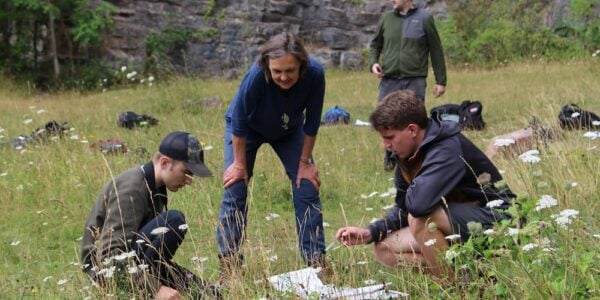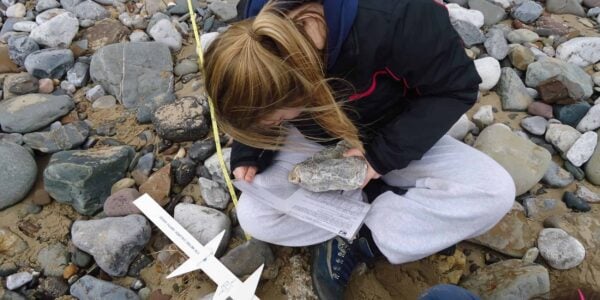This course provides an opportunity for schools with low student numbers to tackle different fieldwork enquiries across a range of dynamic habitats.
Our environmental science courses offer:
- first-hand experience of all the required sampling techniques (ST) to gain in-depth understanding of all required methodologies (Me).
- the opportunity to use a variety of specialist fieldwork equipment useful to the study of Environmental Science including moth and mammal traps and infiltrometers.
- enquiries set within an environmental context enabling students to gain a broad and deep understanding of real-world Environmental Science.
- mathematical skills and the use of GIS to encourage students to interrogate and manipulate fieldwork data.
Slapton Ley Field Centre is located on the Start Bay coast in South Devon and is surrounded by Slapton Ley National Nature Reserve. The Ley is the largest natural freshwater lake in the South West and is separated from the sea by Slapton Sands, a barrier beach. The 214 hectare reserve has been managed by Slapton Ley for over 50 years as an “outdoor laboratory” for education and conservation, and boasts a rich mosaic of habitats including ancient and coppiced woodland, freshwater lake and stream, shingle ridge and rocky shore. The centre offers visitors of all ages the opportunity to experience a unique outdoor learning environment in combination with specialist teaching and facilities.
These courses are for groups of 9 or less students from any one school. Students must be accompanied by a responsible adult (usually a teacher from a school, but could be a parent/carer for an individual student).
The course price includes in-course transport, whilst at the centre, and is exempt from VAT.
Please bring your own packed lunch for the first day. All other meals are included up to a packed lunch on the last day.
Example Timetable
Day 1
Morning
Arrive Midday
Students greeted by staff.
Welcome talk and centre tour.
Pre-course meeting with our staff and teachers.
Allocation of wellies/waterproofs.
Afternoon
Biodiversity (Terrestrial)
Random sampling will be used to collect biotic and abiotic data to compare two contrasting areas of woodland or grassland. Students will calculate Simpson’s Index of Diversity for ground flora. Findings will be linked to wider context of forest management, considering issues such as biodiversity and productivity, soil, hydrology, and climate change.
Evening
Data Analysis
Using the data collected in the afternoon, students have the opportunity to consider data presentation techniques and use a Mann-Whitney U statistical test to compare the biodiversity in their two sample areas.
Day 2
Morning
Freshwater Pollution Study
An investigation into the effect of organic pollution in a freshwater ecosystem. Students will collect data, using kick sampling, on species abundance, diversity and composition and learn how freshwater invertebrates can be used to calculate biotic indices. They will also measure associated abiotic factors including pH, temperature, nitrate and phosphate levels, and dissolved oxygen content to help support their findings.
Afternoon and Evening
Population Monitoring
First-hand experience using different techniques to investigate populations of organisms including estimating the population size of an organism in a habitat using the Lincoln Index, investigating invertebrate communities using pitfall traps, and considering how temporal change impacts the populations of flying organisms using moth traps and bat detectors.
Day 3
Morning and Afternoon
Ecological Succession
An investigation into the process of ecological succession exploring how plant communities and associated environmental factors change over time. Students may use systematic sampling to collect data along a transect for a range of abiotic factors and species’ abundance and distribution using appropriate quadrats. This data can then be used to construct scatter graphs and analyse relationships between biotic and abiotic factors using Spearman's Rank Correlation Coefficient.
Evening
Management and Conservation of Habitats
Students will consider human impacts on conservation, how the control of ecological succession is needed to conserve plagioclimax habitats. Students will also consider how human activity can threaten conservation efforts, using a real-world decision-making task based on their study location during the day.
Day 4
Morning
The Carbon Cycle
An investigation into the role of woodland in carbon storage and sequestration. Students will calculate mean tree mass and tree spacing to estimate carbon storage per hectare in a woodland. Students can then consider the carbon footprints of various activities and investigate the effectiveness of carbon offsetting schemes.
Afternoon and Evening
Measuring Edaphic Factors
Using local habitats as a context, students will consider the causes of soil fertility, degradation and erosion, and soil management strategies. They will design activities to investigate environmental issues associated with soil which could include looking at percentage moisture and organic content, soil pH, sedimentation and use of soil triangles.
Day 5
Morning
Ecosystem Management and Conservation
A visit to a local site of conservation interest to consider the importance of the conservation of biodiversity. Real life examples will be used to discuss the way in which human activities are affecting biodiversity, the importance of ecological monitoring and methods of conserving biodiversity, including international and local legislation and protocols, habitat management techniques and sustainable resource management.
Depart at Midday
Review of the course.
Signposting further actions and opportunities with Field Studies Council and beyond.
Final farewell from our staff.
Please note: to ensure safe and quality learning experiences for students, the timetable may alter depending on weather conditions and local factors at centres.
What's Included
Opportunities to attend this course
-
Mon 23, September 2024 14:00 - Fri 27, September 2024 12:30


